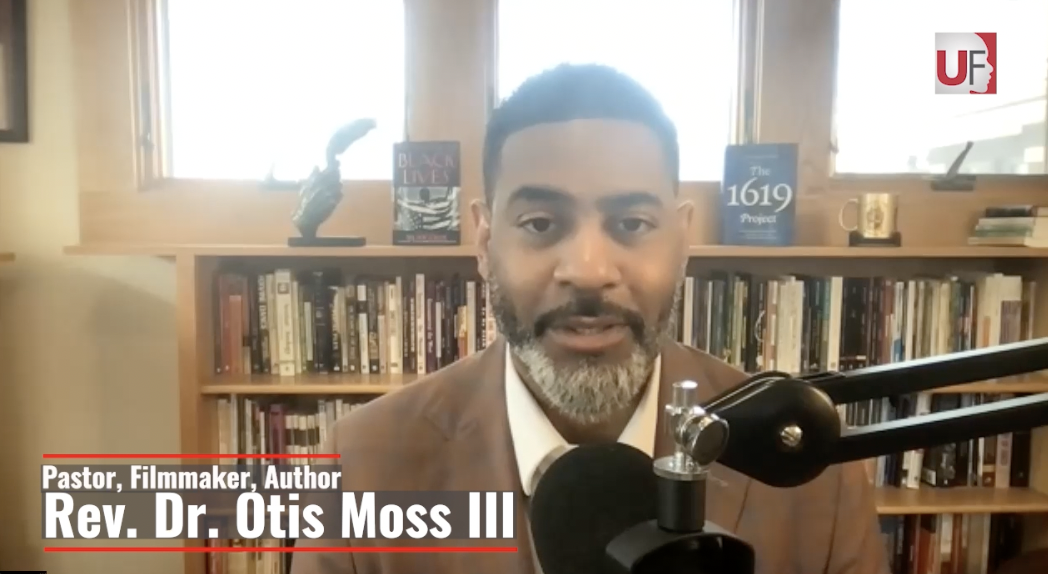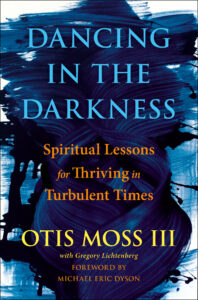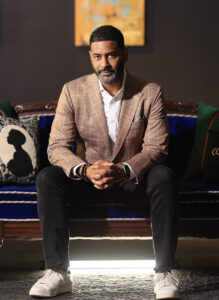
by Allen Reynolds, UrbanFaith Editor | Feb 20, 2023 | Black History, Commentary, Headline News, Social Justice |
Rev. Dr. Otis Moss III is one of the most prolific prophetic voices of our generation. He is the Senior Pastor of Trinity United Church of Christ in Chicago, IL and his new book Dancing in the Darkness gives practical wisdom to face the darkness in our lives with prophetic hope. UrbanFaith editor Allen Reynolds sat down with his fellow HBCU and Yale alumnus, the one and only Rev. Moss to discuss his new book Dancing in the Darkness: Spiritual Lessons for Thriving in Turbulent Times. You can find the book everywhere books are sold and more about the book is below.
Rev. Moss serves as Senior Pastor of Trinity United Church of Christ which was the home church of President Barack and Michelle Obama. He has won multiple awards for his short film Otis’ Dream about his grandfather’s fight to vote in the United States. His parents were on the front line of the Civil Rights Movement, and he has been at the forefront of the fight for justice and civil rights in the 21st century. He calls himself a blues man committed to uniting love and justice in the tradition of Rev. Dr. Martin Luther King Jr. More about the book is below.

Once again, as Dr. Martin Luther King, Jr. first observed in the 1960s, it is midnight in America—a dark time of division and anxiety, with threats of violence looming in the shadows. In 2008, the Trinity United Church in Chicago received threats when one of its parishioners, Senator Barack Obama, ran for president. “We’re going to kill you” rang in Reverend Otis Moss’s ears when he suddenly heard a noise in the middle of the night. He grabbed a baseball bat to confront the intruder in his home. When he opened the door to his daughter’s room, he found that the source of the noise was his own little girl, dancing. She was simply practicing for her ballet recital.
In that moment, Pastor Moss saw that the real intruder was within him. Caught in a cycle of worry and anger, he had allowed the darkness inside. But seeing his daughter evoked Psalm 30: “You have turned my mourning into dancing.” He set out to write the sermon that became this inspiring and transformative book.
Dancing in the Darkness is a life-affirming guide to the practical, political, and spiritual challenges of our day. Drawing on the teachings of Dr. King, Howard Thurman, sacred scripture, southern wisdom, global spiritual traditions, Black culture, and his own personal experiences, Dr. Moss instructs you on how to practice spiritual resistance by combining justice and love. This collection helps us tap the spiritual reserves we all possess but too often overlook, so we can slay our personal demon, confront our civic challenges, and reach our highest goals.

by Dr. Vincent Bacote | Feb 8, 2012 | Feature, Headline News |

ON THE HOT SEAT: Last month, Bishop T.D. Jakes discussed his views on the Trinity with Elephant Room leaders James MacDonald and Mark Driscoll. (Photo: The Elephant Room)
There has been considerable discussion regarding the Elephant Room 2 in light of T.D. Jakes’ invitation and appearance. For those unfamiliar with the controversy, check out UrbanFaith news editor Christine Scheller’s roundup of reactions to the event. In short, the Elephant Room is a gathering of evangelical megachurch pastors who discuss the theological and ecclesiological “elephants in the room.” The second convening of the event took place on January 25, and the headlining “elephant” was Bishop T.D. Jakes and his beliefs regarding the doctrine of the Trinity.
Much has been written about the strange interrogation Jakes endured and the wisdom of inviting such a polarizing figure in the first place. Here are a few more thoughts:
1. While there is admittedly something intriguing about the concept of the Elephant Room, where prominent church leaders with significantly different approaches to ministry come together and speak frankly with each other, I wonder how much all of this plays into the problems of celebrity evangelicalism. It is good to get successful leaders together in settings like this, but do these events also run the risk of suggesting that certain forms of success in ministry also equate with the highest levels of biblical and theological expertise? I don’t know the various educational backgrounds of all the participants, so I can’t make any claims about their theological backgrounds, but it is worth asking how we grant authority to the opinions of successful church leaders, particularly given the populism of evangelicalism.
2. I don’t know the circumstances of Jakes’ invitation, but some of the controversy relates to whether his presence at the Elephant Room 2 was a tacit endorsement of his ministry and whether he truly preaches the gospel. I wonder what would have been the kind of circumstance where his invitation would have been okay with everyone and where there could have been not only a conversation about the Trinity but also the other elephant that lingers — Jakes modified, marketable, and therapeutic version of the prosperity gospel. The conversation needs to happen, but how does that occur? What event could have been created to have this conversation without the cloud of controversy?
3. Race and evangelicalism remains massively complex. Some applaud Bryan Lorrits’ comments on his blog and on a video regarding the centrality of white leaders in this movement that tacitly claims to speak for all evangelicals and (for some) the apparent desire of the approval of such leaders in the critique of Jakes. While there may be truth to Lorrits’ comments, here is why this is difficult. Any African American who comes into evangelicalism and attends seminary will be primarily taught by white professors, and if they embrace what they are teaching and then have some critique of the black church (not that there is one tradition, because there are many), of course it will seem like their critique is one that gets “approved” by white leaders. It is certainly possible that some desire this approval, but it is also true that some bring their critique on the basis of convictions that they fully embrace apart from any affinity for white approval (this is not only about Reformed theology — it can happen with Arminian theology or other traditions as well).
What makes this so complicated is the fact that the ripple effects remain from centuries of racism, and the issues of power, respect, and control all hover around situations like this one, making it difficult to see where this is simply about disagreements about correct doctrine/practice or about participation in contexts that remain largely white (whether it is the Gospel Coalition or any other evangelical institution/group).
Perhaps there is opportunity in this to look more closely at these complexities and then make some real progress on issues of race — we may have taken some steps forward but we have miles to go.
I hope constructive conversation lies ahead.




